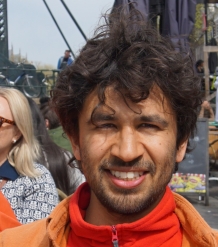
Dr Siddharth Unnithan Kumar
Postdoctoral Research Fellow (RENEW)
S.Unnithan-Kumar@exeter.ac.uk
Environment and Sustainability Institute
Environment and Sustainability Institute, University of Exeter, Penryn Campus, Penryn, Cornwall, TR10 9FE, UK
Overview
After training in mathematics, I have worked closely with (and have had the contours of my mind shaped by) geographers, ecologists, anthropologists, and Indigenous scholars, among others. This has been anything but a linear journey; at present, I am drawn to understanding how humans relate with each other and with the more-than-human world, and how concepts and perceptions of the world influence (and, in turn, are influenced by) how one lives and acts in the world.
I think that mathematics can play a much richer and more thoughtful role in environmental research than its current applications suggest. Mathematics has long developed in close reciprocity with physics; as a result, mathematical methods have been transplanted from the physical sciences with little modification for an ecological context. However, the lens of particle mechanics and the 'animal economicus' which presently pervade quantitative models in ecology, while valuable to some degree, need not be the only (or most suitable) approach to studying, and living with, the ecological relations in which one is embedded.
By examining how conceptual relationships in mathematics correspond closely with those in other disciplines (such as topological concepts in the social sciences); by investigating the implicit hierarchies of knowledge and power which underlie the historical and present applications of mathematics; by inquiring into how mathematics manifests in the human mind and relies on the cultural and ecological world for its coherence; and by attending to lived experience and the intelligence of the body; I hope to develop new ways of doing mathematics, inspired by ecological thought, which can be in service to the needs of this time. These ideas are further articulated here.
In February 2024, I started a three-year postdoctoral position with the University of Exeter's RENEW programme, working with Kevin Gaston and Peter Challenor to develop the uses of mathematics in ecology; in particular, bringing mathematical methods into correspondence with embodied experience of nature through the concept of a 'personalised ecology'.
None of this is a solitary endeavour; I am grateful to my friends, family and teachers, without whom this journey would not come into being. Among those who have been inspiring for my work are: David Abram, John O'Donohue, Marilyn Strathern, Thích Nhất Hạnh, Tim Ingold, E. Richard Atleo, Allegra Wint, Jalaluddin Rumi, Sam Cushman, and Port Meadow.
Qualifications
2023: PhD titled 'Mathematical ecology in a more-than-human world', at the intersection of mathematics, ecology and geography. Supervised by Sam Cushman and Philip Maini. University of Oxford.
2019: Masters in mathematics, first class. University of Oxford. Primary fields of interest: algebraic topology, algebraic geometry, homological algebra, Lie groups.
2018: Bachelors in mathematics, first class. University of Oxford.
Research
Research projects
Developing an ecological mathematics (outlined here).
Connectivity and minimal/digital ecologies; this began here. With Sam Cushman, Jonathon Turnbull, Tim Hodgetts and Oscar Hartman Davies.
Thinking through and modelling personalised ecologies. With Kevin Gaston.
Building a model for biodiversity restoration strategies. With Kevin Gaston and David Baker.
Publications
Journal articles
Teaching
My previous university teaching experience has been in the Mathematical Institute at the University of Oxford. I have also taught mathematics with younger audiences, such as in the Samstanling monastery school in Ladakh.2020: Tutor for C3.1 Algebraic Topology.
2020: Teaching assistant for C3.3 Differentiable Manifolds (with Christoph Weis).
2020: Supervision of a mathematics undergraduate summer project, involving applications of topological methods to studying patterns in telemetry data from African lions in southern-central Africa.
2019: Teaching assistant for two sets of classes in C2.2 Homological Algebra (with André Henriques).
2019: Teaching assistant for C3.5 Lie Groups (with Andrew Dancer).



